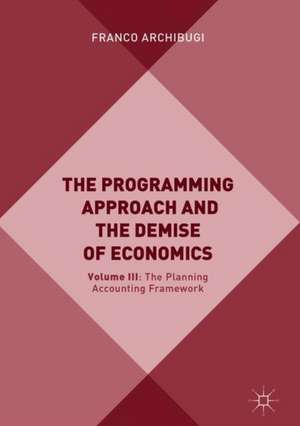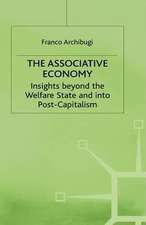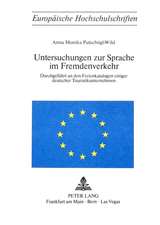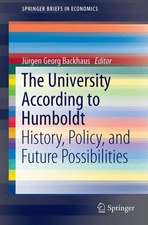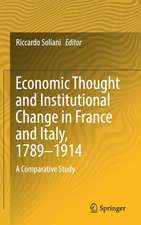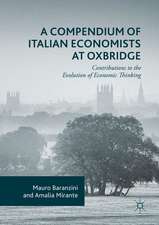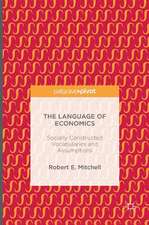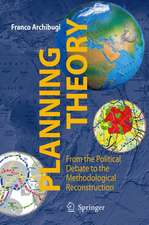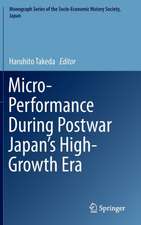The Programming Approach and the Demise of Economics: Volume III: The Planning Accounting Framework (PAF)
Autor Franco Archibugien Limba Engleză Hardback – 2 dec 2019
Volume III furthers and concludes work presented in Volume I and Volume II, and introduces a concrete and practical example of how to build a Planning Accounting Framework (PAF), as associated with Frisch's 'plan-frame' (explored in Volume II), to demonstrate the extent to which decisions and negotiations can be routed in the social sciences. The PAF is an instrument of the programming approach that can be used to verify the compatibility of decisions and their effects. The author builds on Frisch's classical PAF to maximise the phenomenology of economic systems, and assure a consistent and effective implementation of decision making.
| Toate formatele și edițiile | Preț | Express |
|---|---|---|
| Hardback (3) | 644.95 lei 6-8 săpt. | |
| Springer International Publishing – 2 dec 2019 | 644.95 lei 6-8 săpt. | |
| Springer International Publishing – 2 dec 2019 | 651.67 lei 6-8 săpt. | |
| Springer International Publishing – 6 dec 2019 | 655.60 lei 6-8 săpt. |
Preț: 644.95 lei
Preț vechi: 758.77 lei
-15% Nou
Puncte Express: 967
Preț estimativ în valută:
123.42€ • 127.51$ • 102.67£
123.42€ • 127.51$ • 102.67£
Carte tipărită la comandă
Livrare economică 19 martie-02 aprilie
Preluare comenzi: 021 569.72.76
Specificații
ISBN-13: 9783319780627
ISBN-10: 331978062X
Pagini: 289
Ilustrații: XXII, 308 p. 6 illus.
Dimensiuni: 148 x 210 mm
Greutate: 0.54 kg
Ediția:1st ed. 2019
Editura: Springer International Publishing
Colecția Palgrave Macmillan
Locul publicării:Cham, Switzerland
ISBN-10: 331978062X
Pagini: 289
Ilustrații: XXII, 308 p. 6 illus.
Dimensiuni: 148 x 210 mm
Greutate: 0.54 kg
Ediția:1st ed. 2019
Editura: Springer International Publishing
Colecția Palgrave Macmillan
Locul publicării:Cham, Switzerland
Cuprins
1. The ‘Planning Accounting Frame’(PAF), as an instrument of the ‘programming approach’.- 2. The spatial dimension of the Planning Accounting Framework.- 3. A ‘System of models’ for the PAF elaboration.- 4. The political and practical use of the PAF.- 5. Conclusive considerations.
Notă biografică
Professor Franco Archibugi is the Founder and Chairman of the Planning Studies Centre in Rome, Italy. Prior to this he taught economics at the University of Florence, Italy and planning at the Universities of Calabria, Palermo, and Naples, Italy. He studied history and philosophy at the Universities of Rome and Heidelberg, and economics at the London School of Economics. He is the author of many books and papers on socio-economic, environmental and urban planning published in Italian, English and other languages.
Textul de pe ultima copertă
This trilogy deals with an epistemology of economics, arguing for a radical overturning of conventional analysis and providing an alternative to political economy and social sciences, based not on positivism, but on a normative and programming paradigm.
Volume III furthers work presented in Volume I and Volume II, and introduces a concrete and practical example of how to build a Planning Accounting Framework (PAF), as associated with Frisch's 'plan-frame' (explored in Volume II), to demonstrate the extent to which decisions and negotiations can be routed in the social sciences. The PAF is an instrument of the programming approach that can be used to verify the compatibility of decisions and their effects. The author builds on Frisch's classical PAF to maximise the phenomenology of economic systems, and assure a consistent and effective implementation of decision making.
Volume III furthers work presented in Volume I and Volume II, and introduces a concrete and practical example of how to build a Planning Accounting Framework (PAF), as associated with Frisch's 'plan-frame' (explored in Volume II), to demonstrate the extent to which decisions and negotiations can be routed in the social sciences. The PAF is an instrument of the programming approach that can be used to verify the compatibility of decisions and their effects. The author builds on Frisch's classical PAF to maximise the phenomenology of economic systems, and assure a consistent and effective implementation of decision making.
Caracteristici
Presents an argument that leads to a reappraisal of the foundations of economics Reappraises the methodological aspects of political economy and the social sciences Promotes a new theory of 'Planology' as a new unified approach to planning and as an autonomous discipline Develops the outline of a "Post-Economics" operational and managerial planning perspective
